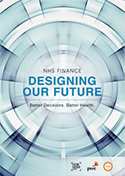Finance function: designing our future

The NHS finance function has a major and exciting role in delivering the NHS long-term plan, but it needs to change the way it works and ensure it has the right skills to play its full part.
This is the headline from a new report published by Future-Focused Finance, the HFMA and consultancy PwC – NHS finance: designing our future – that starts to develop a vision for the NHS finance profession and seeks the function’s views on the opportunities and challenges it faces. It explores the impact that new technology will have on the role played by finance teams and how the function may need to adapt to support greater system working.
The report starts by underlining the point that finance professionals already make a significant contribution to the success of the health service – choosing to work in NHS finance to make a difference to people’s lives. However, it also acknowledges that ‘there is work to be done’ if the function is to continue providing optimal support to ensure better decision-making leads to better health.
Rising to the challenge
The report grew out of a challenge from the NHS Financial Leadership Council and looks to identify what needs to happen to build the NHS finance workforce of the future – just as the Interim NHS people plan focused on ensuring the NHS has sufficient, appropriately skilled clinical staff to meet its future demands. The goal (see Vision statement) is for an innovative finance function that is highly rated with a make-up that reflects the community it serves and one that both develops its own staff and attracts the best from other sectors.
 ‘As well as drawing on FFF and HFMA resources, we brought in people from outside the service because we deliberately wanted to ensure we explored more radical ideas and ideas from outside the NHS,’ says David Ellcock, FFF programme director.
‘As well as drawing on FFF and HFMA resources, we brought in people from outside the service because we deliberately wanted to ensure we explored more radical ideas and ideas from outside the NHS,’ says David Ellcock, FFF programme director.
‘Some 200 finance professionals have been involved in the thinking behind this report, but the intention was always to go back out to finance staff in the service as they need to own this vision. So we are very serious about wanting to hear the views of the function – and others – about this vision for finance. Does it make sense and, if this is the right vision, what do we need to do now to prepare for it?’
The joint report sets out the significant challenges facing the NHS in the coming years. An ageing population and increasing levels of long-term conditions will place additional demands on a service whose care model has stayed broadly the same since the NHS was created.
The NHS has identified a broadly supported plan of action – more personalised support and care with a greater reliance on digital technology, a greater focus on prevention and the wider determinants of health, and a more collaborative approach to delivering integrated care that meets the needs of patients. But it needs help getting there, especially given major challenges in terms of funding and staffing levels.
It will require a finance function on the top of its game and totally focused on the things that add most value. Increasingly, finance will be concentrated on the delivery of value across systems and at population level. Within the current structures and system of regulation, finance teams must continue to support individual organisations. But at the same time, they need to help systems to start looking more broadly at the implications of decisions on the whole system.
Mr Ellcock says finance must be at the forefront of the value agenda. ‘Finance staff, working with informatics colleagues, have access to and the skills to turn wide-ranging data into information that makes sense to clinicians. They have to be in the driving seat on this issue, interpreting numbers and presenting data in a powerful way that helps to tell a story.’
Relationships with clinical staff – well established in some areas – will need to get closer and far more widespread, with finance increasingly working as business partners to address unwarranted clinical variation and support continuous improvement. More time will be spent on analysis and less on data gathering, with transactional activities increasingly automated, creating time for more value-adding work.
‘There aren’t enough people in outward-facing business partner-type roles and the people in these roles usually have too many distractions,’ says Josh Walker, a director with PwC. ‘They often spend more time data-gathering rather than rapidly interpreting that data and communicating with frontline teams to improve the decisions that will affect patients’ health, staff experience and taxpayer value.’
Technology has huge potential to support NHS transformation. Understandably the focus is on its role in frontline services. Genomics will drive the personalisation of care. Virtual consultations will bring radical changes to outpatient and general practice services. And diagnostics and monitoring could be undertaken in people’s homes thanks to advances in wearable technology.
Technology also has the potential to transform back-office data-gathering and routine processes. Cloud computing, blockchain, artificial intelligence and robotics all have the potential to help (see box).
Research carried out by PwC and commissioned by FFF – published alongside the Designing our future report – concludes that the NHS needs to urgently invest in technology to support NHS finance.
It calls for the number of separate systems used to be significantly reduced and functionality enhanced to provide ‘real time, high quality insight’. According to the consultancy, this should involve standardising finance ledgers to enable faster consolidation, analysis and benchmarking.
‘There is still a lot of time spent pulling data out of ledgers and putting it into spreadsheets to then send to the centre to be consolidated again,’ says Mr Walker. ‘There has to be a better technological solution that would improve accuracy, speed up the flow of information and free up senior time for better use.’
The Designing our future report recognises that the future finance function will look different. ‘We need to be honest,’ says Mr Ellcock. ‘There will undoubtedly be fewer roles at the processing end of the spectrum – robotic process automation is coming down the line.’
Changing roles
However, at the same time, the function will need finance staff increasingly to take on business partner roles. For many people in NHS finance, this will mean more exciting and fulfilling roles and greater levels of engagement leading to better value.
A smaller number of organisations – initially as commissioners come together – will mean that not all senior posts will be at board level. So, instead of the classic hierarchical pyramid, the workforce will be shaped more like a flat-topped diamond.
Simon Worthington, director of finance at Leeds Teaching Hospitals NHS Trust and a member of the Finance Leadership Council, believes changes will emerge over time, pointing out that the report is a long-term vision. ‘We need the right number of NHS finance staff to support the service,’ he says. ‘The team needs to support the service to be more productive and be more productive itself. We haven’t tried, and won’t be trying, to do a calculation of what this means for the workforce size.’
However, the service will need to think about how it makes the transition. Career paths will change and a finance function that wants to retain its staff and keep their experience will have to accommodate different working practices – part-time working mid-career, for example, or finance directors who want to remain working but step away from the most senior roles.
‘Staff development will be key to all this and staff will need to be given the right opportunities to develop,’ says Emma Knowles, director of policy and research at the HFMA. ‘We need to have a clear idea of what we’ll have to deliver and take steps now to make sure we will be in the right position to make that happen.’
This will mean establishing the finance function as a diverse group that can attract the best finance professionals to work in the NHS and provide relevant career development opportunities.
The report is also clear that this is not the sole responsibility of central authorities. Finance staff need to take personal responsibility for their own careers, taking advantage of personal development opportunities and understanding where they need to improve skills or develop new ones.
Even with greater process automation, staff will need to retain the corresponding technical skills in case of error or fraud and to be able to confirm the legitimacy of any warnings. But on top of this, staff will increasingly need analytical capabilities to interpret data and communicate it effectively across systems. And, as finance staff focus more on business partnering roles, they will need to need to build communication, influencing, planning and negotiating skills (see Working together).
The report also explores some specific challenges facing the finance function. The current underinvestment in back-office technology needs to be addressed to access benefits such as greater accuracy, efficiency and timeliness. But resources are tight and, understandably focused on frontline care. The report acknowledges that shared services could offer a solution. But it insists that this has to be balanced with retaining sufficient local flexibility to enable systems to report and monitor work to deliver local population health issues.
And what of the move to greater system working, with the establishment of integrated care systems by 2021? The report says that ‘acting as a single finance function within the NHS’ would help to enable this new way of working and asks finance practitioners for their views on whether finance teams or certain activities could be consolidated across wider areas. Mr Walker says this is not necessarily about merging teams, but about practical steps that would pool capacity within systems.
‘Each month practitioners are pulling together reports that someone else in another organisation is also pulling together from the opposite point of view – that can’t be the optimum way of doing things,’ says Mr Walker. He would like to see organisations connecting finance people across the system at all levels and looking for opportunities where activities could be undertaken together rather than in isolation.
Mr Worthington says more joined-up working practices are emerging, with finance teams finding ways to work differently and be more productive as the service focuses on integrated care systems. ‘This is something that will evolve differently in different places dependent on how local organisations and systems are structured,’ he says.
It is now over to the finance function for its feedback and input. There will be opportunities to discuss the document in the new year at national and regional events, and this will be backed up by an online engagement platform that aims to give everyone in NHS finance the chance to have their say.
‘Designing our future is currently based on the thoughts of 200 senior NHS finance staff,’ says Mr Worthington. ‘The report will not be finalised until all staff have had an opportunity to input and we have taken their views on board.’
Working with technology
• Cloud computing is already being used in some parts of the NHS to give instant access to stored data from a range of network connections. But Designing our future says it has the capacity to further simplify data flows, improve standardisation and enhance communication across organisations and systems.
• Blockchain has potential to transform practices in the NHS finance function. It offers the possibility of recording and verifying transactions simultaneously in real time, eliminating overheads and the need for individual payments between organisations. The report says that, with a large proportion of transactions being internal, blockchain could be the catalyst for removing the inefficiencies of multiple payments and reconciliations.
• Artificial intelligence is set to have a major role in the move to population health management, enabling systems to understand patterns of need and forecast how these may change in the future.
• Robotic process automation (RPA) could take on many high-volume, low-complexity tasks that are often repeated daily, weekly, monthly or annually. This will speed up processes and free staff to work on more value-adding activities and potentially enhance accuracy and consistency. Faster speeds may also support the delivery of more timely information for decision-making.
Together, these technologies could help the finance function to deliver real-time data and insights, leading to better allocation of resources and improved investment decisions.
 Vision statement
Vision statement
Designing our future says: ‘Our vision is that working in NHS finance is something to which people aspire. It will be consistently rated as one of the best and most diverse employers in the country, developing its own staff and attracting the best from elsewhere. The profession will be recognised as a key ingredient to delivering world-class healthcare, innovating to drive value and enabling the best outcomes for patients.’
Related content
We are excited to bring you a fun packed Eastern Branch Conference in 2025 over three days.
This event is for those that will benefit from an overview of costing in the NHS or those new to costing and will cover why we cost and the processes.